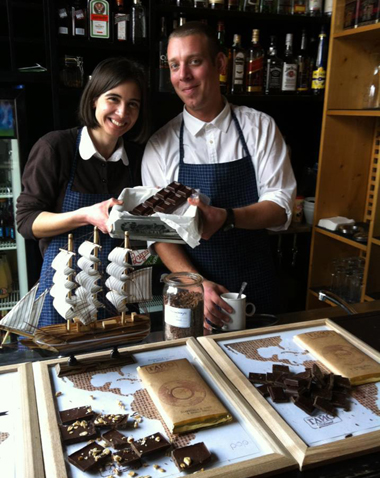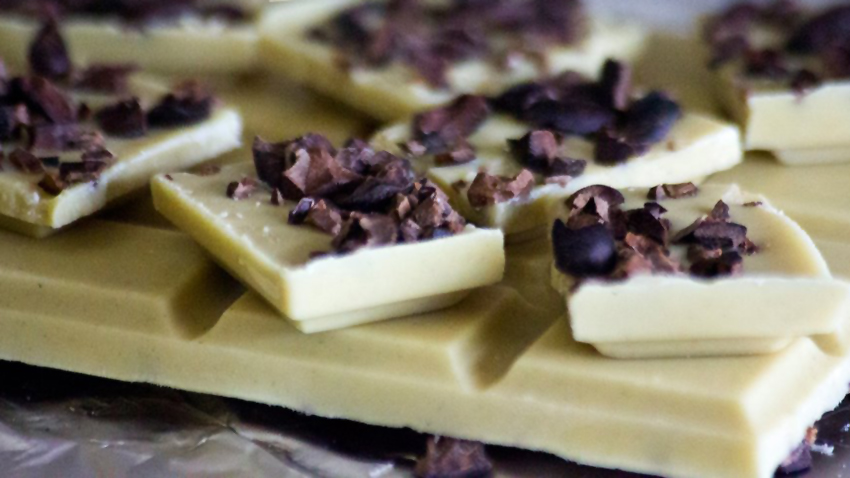In the space of just a few years, the chocolate Maria and Vincent Gaillot make has become very popular among fans of handcrafted bio-chocolate. As Christmas approaches we go to their workshop in Plovdiv to ask them how their small business has been facing up to the challenges of life in Bulgaria.
To this day Vincent and Maria are among the very few manufacturers in Bulgaria of handcrafted “fairtrade” chocolate with guaranteed provenance and no chemical additives. As Christmas draws nearer, purchase orders have multiplied and the small company is finding it difficult to cope, all the more so that in this holiday season, part of the production is earmarked to be dispatched to a home for children with disabilities.
Making chocolate is very much like making wine. First come the fruit and the soil where they grew. When raw, cocoa beans have an aroma and flavour that the master craftsman has to process, using his or her imagination to determine the character of the end product – a sensitive palate comes with time and experience.
 Vincent and Maria employ five; their selection of workers again follows certain principles – people nearing retirement age who would find it difficult to get another job and who have never worked in the chocolate industry. We asked Vincent: Why chocolate and why Bulgaria?
Vincent and Maria employ five; their selection of workers again follows certain principles – people nearing retirement age who would find it difficult to get another job and who have never worked in the chocolate industry. We asked Vincent: Why chocolate and why Bulgaria?
“As a matter of fact chocolate has been “haunting” us since the start of our relationship. Our first contact with cocoa was when we went to Venezuela together. That was when we realized that it is much more than the cocoa powder you find in supermarkets. When we decided to start a business in Bulgaria, we wanted it to be something that would appeal to us both, not just to work and wait for our paycheck. And the idea of chocolate came up naturally.”
To those who are hesitant whether to start a business in Bulgaria or not, Vincent says:
“Contrary to what we had expected, it wasn’t all that complicated. We applied through the proper channels because we wanted everything to be legal, with no administrative loopholes or tax stunts, though that is still very widespread.”
Vincent says that it was perhaps easier for him because he is a foreign national, a Frenchman, so people were more understanding.
To equip his workshop, Vincent had the machines delivered from abroad. The small mill and the millstones were made in India by an American company, the machine that sifts the beans from the shells he made himself, using schematics he found online.
We asked him what his philosophy is and what makes his chocolate different from all other kinds of chocolate?
“We make it different. Of course, we were inspired by other chocolate makers we trained with in France and Italy. Our ideal is a pure chocolate, pure in every respect.”
 “Pure” chocolate refers to the raw material used but also to work and business relations. “We only do business with small plantations that have all required certificates,” says Vincent. “We can’t afford to use cocoa beans if there is even the slightest suspicion of the use of slave or child labour.”
“Pure” chocolate refers to the raw material used but also to work and business relations. “We only do business with small plantations that have all required certificates,” says Vincent. “We can’t afford to use cocoa beans if there is even the slightest suspicion of the use of slave or child labour.”
And finally, how is a small-time manufacturer able to cope with competition from multinational companies?
“I think that when there is a clear vision and approach, marketing the product is no problem. Competition in our sphere comes mostly from industrial manufacturers. For example, if you are looking for chocolate that has no soy lecithin in it, or artificial vanilla, chocolate whose provenance and quality is guaranteed, you will find that in Bulgaria, we are the only manufacturers. What our customers want is a pure product and they are willing to pay a higher price to get it.”
Ever since the brand was included in an international encyclopedia, Vincent and Maria Gaillothave had orders coming from abroad but they say they do not want to grow excessively – both are keen to have enough spare time to devote to family, friends and music.
English version: Milena Daynova
The prices of Easter goods are rising The Easter meal in the Balkan countries will be more expensive this year, BTA reports. Lamb in Serbia costs about 1,400 dinars (EUR 11.5) per kilogram in supermarkets. On Good Friday, fish..
Residents and visitors to Sofia will have the opportunity to learn more about Bulgarian scientists working in Antarctica and their important role in the exploration of the continent. The exhibition "Antarctic People - Caring for the Earth" by BNR..
Looking and feeling your best doesn’t have to come at a high price — especially in Bulgaria. The country has become a rising star in beauty tourism, offering top-tier salon services at prices that won’t break the bank. Whether you’re a local or a..
Looking and feeling your best doesn’t have to come at a high price — especially in Bulgaria. The country has become a rising star in beauty tourism,..
Residents and visitors to Sofia will have the opportunity to learn more about Bulgarian scientists working in Antarctica and their important role in the..
The prices of Easter goods are rising The Easter meal in the Balkan countries will be more expensive this year, BTA reports...

+359 2 9336 661
